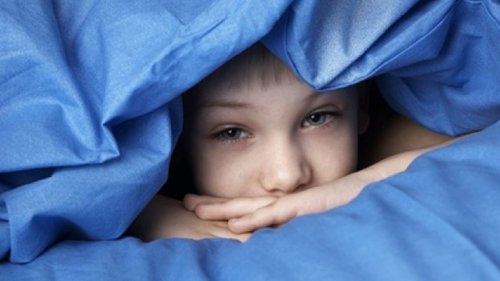10 Consequences of Children Not Getting Enough Sleep


Reviewed and approved by the doctor Nelton Ramos
It’s often believed that only adults have sleep disorders. However, little ones can also experience them. In the following article, we’ll tell you the consequences of children not getting enough sleep in relation to their growth and emotions.
Sleep disorders in children
Believe it or not, about a quarter of children have sleep-related issues. In fact, this is a common concern among parents.
Many times, these disorders are related to bad family habits and lack of limits. This happens when parents go to bed late or don’t strictly enforce screen limits before bedtime.
Insomnia is harmful at any age, but even more so in the case of children. If they don’t sleep well, their biological clock becomes unbalanced. This means they cannot grow or develop accordingly.
Since before birth, humans have special neurons that regulate the time we spend awake and asleep. They control the biological clock in babies, who need more sleep in their first weeks of life.
Of course, it’s not only a biological issue, but also depends a lot on certain external conditions. For example, the amount of light in the room will help them achieve more restful sleep.
When the environment has too much light, the brain thinks it’s time to be awake. That’s why you can’t fall asleep.
How much sleep should my children get according to their age?
Newborns sleep about 16 hours a day in several episodes of about four hours each at most. After 3 months, the duration of night awakenings decreases. Little by little, they sleep more continuously.
By the age of 2, children sleep for about ten hours. At 5, their sleep cycle is already mature enough not to wake up during the night. Also, they won’t need a nap in the middle of the day either.
In adolescence, you may notice that children sleep more. This is due to the hormonal changes that interfere in the biological cycle. On average, they need rest for eight hours in a row each night.

“About a quarter of children have problems related to rest. In fact, it’s one of the most common questions parents ask their pediatricians.”
Consequences of children not getting enough sleep
If children don’t get enough hours of sleep per day, symptoms or signs will quickly appear. Some will be more visible or noticeable than others. Therefore, as parents, we must pay close attention:
- Irritability: A bad mood, crying or sometimes unjustified shouting.
- Restlessness: Hyperactivity.
- Discouragement or decay: They don’t feel like playing or going out to the park.
- Memory problems: They don’t remember basic things.
- Demotivation or lack of encouragement: They don’t express joy for activities that they used to like.
- Reduced school performance: Bad grades, problems understanding lessons, and poor memory.
- Minor accidents: They knock into things due to a decrease in their reflexes.
- More prone to diseases: Lack of sleep weakens the immune system.
- Slow growth: Without sleep, the body cannot grow strong.
How to get your children to sleep well
It’s very important for children to get enough sleep and that this routine is also carried out by adults. Don’t forget that teaching by example works best.
As a first step, you must establish a bedtime routine that happens without exception and includes weekends. The same should occur for a time to get up. Allowing your children to “stay up late” on Saturdays and Sundays is counterproductive to their health.

In addition, it’s recommended that afternoon naps remain short (a maximum of one hour) and that they don’t occur after 4 o’clock. This way they won’t interfere with their nightly sleep cycle.
On the other hand, diet also affects sleep. Dinner should be light and contain mostly vegetables. Fried dishes, sugars and flours slow digestion and make it more difficult to fall asleep.
Last but not least, avoid screens and electronic devices before going to bed. The light radiating from these devices puts the brain on alert. It’s better for children to read a book or quietly play.
It’s often believed that only adults have sleep disorders. However, little ones can also experience them. In the following article, we’ll tell you the consequences of children not getting enough sleep in relation to their growth and emotions.
Sleep disorders in children
Believe it or not, about a quarter of children have sleep-related issues. In fact, this is a common concern among parents.
Many times, these disorders are related to bad family habits and lack of limits. This happens when parents go to bed late or don’t strictly enforce screen limits before bedtime.
Insomnia is harmful at any age, but even more so in the case of children. If they don’t sleep well, their biological clock becomes unbalanced. This means they cannot grow or develop accordingly.
Since before birth, humans have special neurons that regulate the time we spend awake and asleep. They control the biological clock in babies, who need more sleep in their first weeks of life.
Of course, it’s not only a biological issue, but also depends a lot on certain external conditions. For example, the amount of light in the room will help them achieve more restful sleep.
When the environment has too much light, the brain thinks it’s time to be awake. That’s why you can’t fall asleep.
How much sleep should my children get according to their age?
Newborns sleep about 16 hours a day in several episodes of about four hours each at most. After 3 months, the duration of night awakenings decreases. Little by little, they sleep more continuously.
By the age of 2, children sleep for about ten hours. At 5, their sleep cycle is already mature enough not to wake up during the night. Also, they won’t need a nap in the middle of the day either.
In adolescence, you may notice that children sleep more. This is due to the hormonal changes that interfere in the biological cycle. On average, they need rest for eight hours in a row each night.

“About a quarter of children have problems related to rest. In fact, it’s one of the most common questions parents ask their pediatricians.”
Consequences of children not getting enough sleep
If children don’t get enough hours of sleep per day, symptoms or signs will quickly appear. Some will be more visible or noticeable than others. Therefore, as parents, we must pay close attention:
- Irritability: A bad mood, crying or sometimes unjustified shouting.
- Restlessness: Hyperactivity.
- Discouragement or decay: They don’t feel like playing or going out to the park.
- Memory problems: They don’t remember basic things.
- Demotivation or lack of encouragement: They don’t express joy for activities that they used to like.
- Reduced school performance: Bad grades, problems understanding lessons, and poor memory.
- Minor accidents: They knock into things due to a decrease in their reflexes.
- More prone to diseases: Lack of sleep weakens the immune system.
- Slow growth: Without sleep, the body cannot grow strong.
How to get your children to sleep well
It’s very important for children to get enough sleep and that this routine is also carried out by adults. Don’t forget that teaching by example works best.
As a first step, you must establish a bedtime routine that happens without exception and includes weekends. The same should occur for a time to get up. Allowing your children to “stay up late” on Saturdays and Sundays is counterproductive to their health.

In addition, it’s recommended that afternoon naps remain short (a maximum of one hour) and that they don’t occur after 4 o’clock. This way they won’t interfere with their nightly sleep cycle.
On the other hand, diet also affects sleep. Dinner should be light and contain mostly vegetables. Fried dishes, sugars and flours slow digestion and make it more difficult to fall asleep.
Last but not least, avoid screens and electronic devices before going to bed. The light radiating from these devices puts the brain on alert. It’s better for children to read a book or quietly play.
All cited sources were thoroughly reviewed by our team to ensure their quality, reliability, currency, and validity. The bibliography of this article was considered reliable and of academic or scientific accuracy.
- Cruz Navarro IJ. Alteraciones del sueño infantil. En: AEPap (ed.). Curso de Actualización Pediatría 2018. Madrid: Lúa Ediciones 3.0; 2018. p. 317-329.
- Ugarte Líbano R. Insomnio infantil en Atención Primaria. En AEPap ed. Curso de Actualización Pediatría 2015. Madrid: Lúa Ediciones 3.0; 2015. p. 117-28
This text is provided for informational purposes only and does not replace consultation with a professional. If in doubt, consult your specialist.








